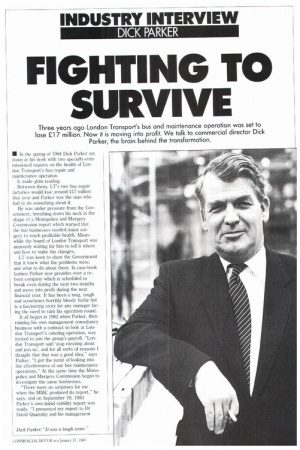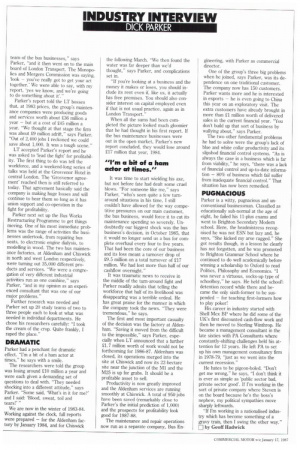FIGHTING TO SURVIVE
Page 39

Page 40

If you've noticed an error in this article please click here to report it so we can fix it.
Three years ago London Transport's bus and maintenance operation was set to lose £17 million. Now it is moving into profit. We talk to commercial director Dick Parker, the brain behind the transformation.
• In the spring of 1984 Dick Parker sat down at his desk with two specially-commissioned reports on the health of London Transport's bus repair and maintenance operation.
It made grim reading.
. Between them, LT's two bus repair factories would lose around 17 million that year and Parker was the man who had to do something about it.
lie was under pressure from the Government, breathing down his neck in the shape of a Monopolies and Mergers Commission report which warned that the bus businesses needed major surgery to reach profitable health. Meanwhile the board of London Transport was anxiously waiting for him to tell it where and how to make the changes.
LT was keen to show the Government that it knew what the problems were, and what to do about them. In case-book fashion Parker now presides over a reborn company which is scheduled to break even during the next two months and move into profit during the next financial year. It has been a long, tough and sometimes horribly bloody battle but is a fascinating story for any manager facing the need to turn his operation round.
It all began in 1982 when Parker, then running his own management consultancy business with a contract to look at London 'rransport's catering operation, was invited to join the group's payroll. "London Transport said 'stop messing about and join us', and for all sorts of reasons I thought that that was a good idea," says Parker. "I got the remit of looking into the effectiveness of our bus maintenance operations." At the same time the Monopolies and Mergers Commission began to investigate the same businesses.
-There were no surprises for me when the MMC produced its report," he says, and on September 19, 1983 Parker's own initial viability report was ready. "I presented my report to Dr David Quarmby and his management
team of the bus businesses," says Parker, "and it then went on to the main board of London Transport. The Monopolies and Mergers Commission was saying, 'look — you've really got to get your act together.' We were able to say, with my report, 'yes we know, and we're going to do something about it'."
Parker's report told the LT bosses that, at 1983 prices, the group's maintenance companies were producing goods and services worth about 236 million a year — but at a cost of 245 million a year. "We thought at that stage the firm was about 29 million adrift," says Parker. "Out of 2,400 jobs I reckoned we could save about 1,000. It was a tough scene."
LT accepted Parker's report and he was asked to 'lead the fight' for profitability. The first thing to do was tell the workforce, and a weekend-long series of talks was held at the Grosvenor Hotel in central London. The 'Grosvenor agreement' reached then is still referred to today. That agreement basically said the company is making huge losses and will continue to bear them so long as it has union support and co-operation in the fight for profitability.
Parker next set up the Bus Works Restructuring Programme to get things moving. One of his most immediate problems was the range of activities the businesses undertook, from repairing bus seats, to electronic engine dialysis, to modelling in wood. The two bus maintenance factories, at Aldenham and Chiswick in north and west London respectively, were turning out 35,000 different products and services. "We were a congregation of very different industrial activities run as one combine," says Parker, "and in my opinion as an experienced consultant that was one of our major problems."
Further research was needed and Parker set up 20 study teams of two to three people each to look at what was needed in individual departments. He chose his researchers carefully: "I took the cream of the crop. Quite frankly, I raped the place."
DRAMATIC
Parker had a penchant for dramatic effect. "I'm a bit of a ham actor at times," he says with a smile.
The researchers were told the group was losing around 210 million a year and were each given a demanding set of questions to deal with. "They needed shocking into a different attitude," says Parker. "Some said, 'What's in it for me?' and I said: 'Blood, sweat, toil and tears!' " We are now in the winter of 1983-84. Working against the clock, full reports were prepared — for the Aldenham factory by January 1984, and for Chiswick the following March. "We then found the water was far deeper than we'd thought," says Parker, and complications set in.
"If you're looking at a business and the money it makes or loses, you should include its rent even if, like us, it actually has free premises. You should also consider interest on capital employed even if that is not usual practice, again as in London Transport."
When all the sums had been completed the picture looked much gloomier that he had thought in his first report. If the bus maintenance businesses were out in the open market, Parker's new report concluded, they would lose around .217 million that year, 1984.
"I'm a bit of a ham actor at times."
It was time to start wielding his axe, but not before fate had dealt some cruel blows. "For someone like me," says Parker, "who's seen quite a few turn' around situations in his time, I still couldn't have allowed for the way competitive pressures on our main customer, the bus business, would force it to cut its maintenance spending so severely. Undoubtedly our biggest shock was the bus business's decision, in October 1985, that it would no longer send us a bus for complete overhaul every four to five years. That had been the core of our business and its loss meant a turnover drop of 29.5 million on a total turnover of 217 million. We had lost more than half of our cashflow overnight."
It was traumatic news to receive in the middle of the turn-around fight and Parker readily admits that telling the workforce that half of its livelihood was disappearing was a terrible ordeal. He has great praise for the manner in which the company took the news. "They were tremendous," he says.
The first and most important casualty of the decision was the factory at Aldenham. "Saving it moved from the difficult to the impossible," says Parker, especially when LT announced that a further 21.7 million worth of work would not be forthcoming for 1986-87. Aldenham was closed, its operations merged into the site at Chiswick and now its 22-hectare site near the junction of the M1 and the M25 is up for grabs. It should be a profitable asset to sell.
Productivity is now greatly improved and the Aldenham services are running smoothly at Chiswick. A total of 950 jobs have been saved (remarkably close to Parker's the initial prediction of 1,000) and the prospects for profitability look good for 1987-88.
The maintenance and repair operations now run as a separate company, Bus En gineering, with Parker as commercial director.
One of the group's three big problems when he joined, says Parker, was its dependence on one traditional customer. The company now has 150 customers. Parker wants more and he is interested in exports — he is even going to China this year on an exploratory visit. The extra customers have already brought in more than .21 million worth of delivered sales in the current financial year. "You don't build up that sort of business by wallying about," says Parker.
The two other fundamental problems he had to solve were the group's lack of blue and white collar productivity and its slipshod financial control systems. "As is always the case in a business which is far from viability," he says, "there was a lack of financial control and up-to-date information — 80% of business which fail suffer from inadequate financial control." That situation has now been remedied.
PUGNACIOUS
Parker is a witty, pugnacious and unconventional businessman. Classified as educationally sub-normal at the age of eight, he failed his 11-plus exams and went to Brighton Secondary Modern school. Here, the headmistress recognised he was not ESN but lazy and, he says, "She kicked my arse ragged." She got results though, in a lesson he clearly has not forgotten, and he was promoted to Brighton Grammar School where he continued to do well academically before winning a scholarship to Oxford to read Politics, Philosophy and Economics. "I was never a virtuous, socks-up type of schoolboy," he says. He held the school': detention record while there and became the only sixth-former to be suspended — for teaching first-formers how to play poker!
His career in industry started with Shell Mex BP where he did some of the UK's first discounted cash-flow work and then he moved to Sterling Winthrop. He became a management consultant in the late sixties with PA Consultants where constantly-shifting challenges held his attention for 12 years. He left PA to set up his own management consultancy firm in 1978-79, "just as we went into the current recession."
He hates to be pigeon-holed. "Don't get me wrong," he says, "I don't think it is ever as simple as 'public sector bad, private sector good'. If I'm working in the sort of private company where Steven is on the board because he's the boss's nephew, my political sympathies move sharply leftwards.
"If I'm working in a nationalised industry which has become something of a gravy train, then I swing the other way." El by Geoff Hadwick












































































